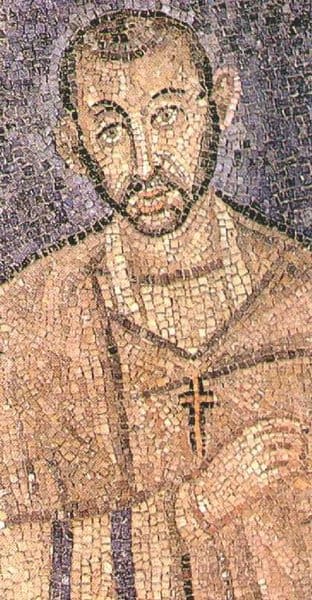In Praise of Gentleness
from a text written by St Ambrose
Has anyone asked for your mercy yet during this Extraordinary Jubilee Year of Mercy? No? Then, perhaps a meditative reading of St. Ambrose’s words here may help engender the kind of demeanor in us, which might inspire them to do so. St. Ambrose, who lived in the 4th century, and who baptized St. Augustine, is one of the original Doctors of the Church. In this excerpt from his writings, he praises gentleness in dealing with those who have offended us or sinned against us, making the reader understand that gentleness facilitates repentance, and thus gives us an opportunity to lavish mercy on others. His words have great import for all of us today, particularly during this Year of Mercy.
+
 “If the highest end of virtue is that which aims at the advancement of most, gentleness is the most lovely of all, which does not hurt even those whom it condemns, and usually renders those whom it condemns worthy of absolution. Moreover, it is the only virtue which has led to the increase of the Church which the Lord sought at the price of His own Blood, imitating the loving kindness of heaven, and aiming at the redemption of all, seeks this end with a gentleness which the ears of men can endure, in presence of which their hearts do not sink, nor their spirits quail.
“If the highest end of virtue is that which aims at the advancement of most, gentleness is the most lovely of all, which does not hurt even those whom it condemns, and usually renders those whom it condemns worthy of absolution. Moreover, it is the only virtue which has led to the increase of the Church which the Lord sought at the price of His own Blood, imitating the loving kindness of heaven, and aiming at the redemption of all, seeks this end with a gentleness which the ears of men can endure, in presence of which their hearts do not sink, nor their spirits quail.
“For he who endeavours to amend the faults of human weakness ought to bear this very weakness on his own shoulders, let it weigh upon himself, not cast it off. For we read that the Shepherd in the Gospel [Luke 15:5] carried the weary sheep, and did not cast it off. And Solomon says: ‘Be not overmuch righteous’ [Sirach 7:16], for restraint should temper righteousness. For how shall he offer himself to you for healing whom you despise, who thinks that he will be an object of contempt, not of compassion, to his physician?
“Therefore had the Lord Jesus compassion upon us in order to call us to Himself, not frighten us away. He came in meekness, He came in humility, and so He said: ‘Come unto Me, all ye that labour and are heavy laden, and I will refresh you’ [Matthew 11:28]. So, then, the Lord Jesus refreshes, and does not shut out nor cast off, and fitly chose such disciples as should be interpreters of the Lord’s will, as should gather together and not drive away the people of God. Whence it is clear that they are not to be counted amongst the disciples of Christ, who think that harsh and proud opinions should be followed, rather than such as are gentle and meek; persons who, while they themselves seek God’s mercy, deny it to others…
“What can show more pride than this, since the Scripture says: ‘No one is free from sin, not even an infant of a day old’ [cf Job 14:4]; and David cries out: ‘Cleanse me from my sin’ [Psalm 51:4]. Are they more holy than David, of whose family Christ vouchsafed to be born in the mystery of the Incarnation, whose descendant is that heavenly Hall which received the world’s Redeemer in her virgin womb? For what is more harsh than to inflict a penance which they do not relax, and by refusing pardon to take away the incentive to penance and repentance? Now no one can repent to good purpose unless he hopes for mercy.”
Now is the acceptable time! Now is the time for mercy! [cf 2 Corinthians 6:2]. Let us open our hearts to the Lord and pray that it be so!
+
* from Ambrose of Milan. (1896). Two Books concerning Repentance. In P. Schaff & H. Wace (Eds.), H. de Romestin, E. de Romestin, & H. T. F. Duckworth (Trans.), St. Ambrose: Select Works and Letters (Vol. 10, p. 329). New York: Christian Literature Company.
Art: Mosaic Detail of St Ambrose from the Church of St. Ambrogio in Milan, could be based on an actual portrait of Ambrose. The building dates back to the 4th century, the mosaic to the second half of the 5th century, artist unknown, photography by Giovanni Dall’Orto, April 25, 2007, PD-US author’s life plus 70 years or less, Wikimedia Commons.




